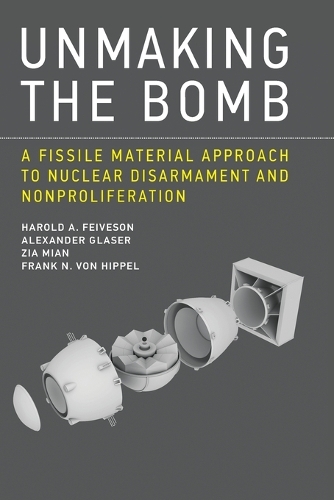
Unmaking the Bomb: A Fissile Material Approach to Nuclear Disarmament and Nonproliferation
(Paperback)
Publishing Details
Unmaking the Bomb: A Fissile Material Approach to Nuclear Disarmament and Nonproliferation
By (Author) Harold A. Feiveson
By (author) Alexander Glaser
By (author) Zia Mian
By (author) Frank N. von Hippel
MIT Press Ltd
MIT Press
2nd September 2016
United States
Classifications
Professional and Scholarly
Non Fiction
Nuclear weapons
327.1747
Physical Properties
Paperback
296
Width 152mm, Height 229mm, Spine 14mm
Description
A new approach to nuclear disarmament, nonproliferation, and the prevention of nuclear terrorism that focuses on controlling the production and stockpiling of nuclear materials.
Achieving nuclear disarmament, stopping nuclear proliferation, and preventing nuclear terrorism are among the most critical challenges facing the world today. Unmaking the Bomb proposes a new approach to reaching these long-held goals. Rather than considering them as separate issues, the authorsphysicists and experts on nuclear securityargue that all three of these goals can be understood and realized together if we focus on the production, stockpiling, and disposal of plutonium and highly enriched uraniumthe fissile materials that are the key ingredients used to make nuclear weapons.
The authors describe the history, production, national stockpiles, and current military and civilian uses of plutonium and highly enriched uranium, and propose policies aimed at reducing and eventually eliminating these fissile materials worldwide. These include an end to the production of highly enriched uranium and plutonium for weapons, an end to their use as reactor fuels, and the verified elimination of all national stockpiles.
Reviews
Feiveson, Glaser, Mian and von Hippel convincingly argue that this problem [of fissile materials] demands a real and immediate solution. Along with the history of nuclear weapons, they cover attempts to control the weapons' spread, including the 1970 Treaty on the Non-Proliferation of Nuclear Weapons; the physics and technology of producing, downblending and storing fuel; and the complexities of convincing nations to agree to be supervised and controlled by an international agency.
Ann Finkbeiner, NatureA succinct, authoritative account of all the fissile material produced in military and civilian nuclear programmes since 1945...To ensure nuclear disarmament, the authors argue, all these materials have to be eliminated.
Rob Edwards, New ScientistThe book masterfully breaks down a very technical and politically charged subject so that its most salient facts are accessible and understandable to technical and nontechnical readers alike. It marshals clear, accurate, and broadly supported data, graphs, charts, and photographs that describe and explain the evolution of the fissile material age and the current global status of these materials in military and civilian programs...Unmaking the Bomb is an invaluable tool for historians, educators, military strategists, students of nuclear disarmament and nonproliferation, and those who advocate the elimination of nuclear weapons.
James Doyle, Arms Control TodayAll nuclear weapons require fissile materialsplutonium and/or highly-enriched uranium (HEU)to function. As many of the world's nuclear powers reduce their stockpiles of weapons, an issue that will come to the fore is that of securing and eventually disposing of the global supply of excess fissile materials. This book describes the history, production, current stockpiles, and uses of fissile materials, and sets out possible policies for reducing and eventually eliminating them...This book should be read and carefully considered by every serious student of the world nuclear situation.
Physics & SocietyAuthor Bio
Harold A. Feiveson is Senior Research Policy Scientist at the Woodrow Wilson School of Public and International Affairs at Princeton University. Alexander Glaser is Assistant Professor in the Woodrow Wilson School and in the Department of Mechanical and Aerospace Engineering at Princeton University. Zia Mian is Research Scientist and Director of the Project on Peace and Security in South Asia at the Woodrow Wilson School. Frank N. von Hippel is Senior Research Physicist and Professor of Public and International Affairs Emeritus at the Woodrow Wilson School.
